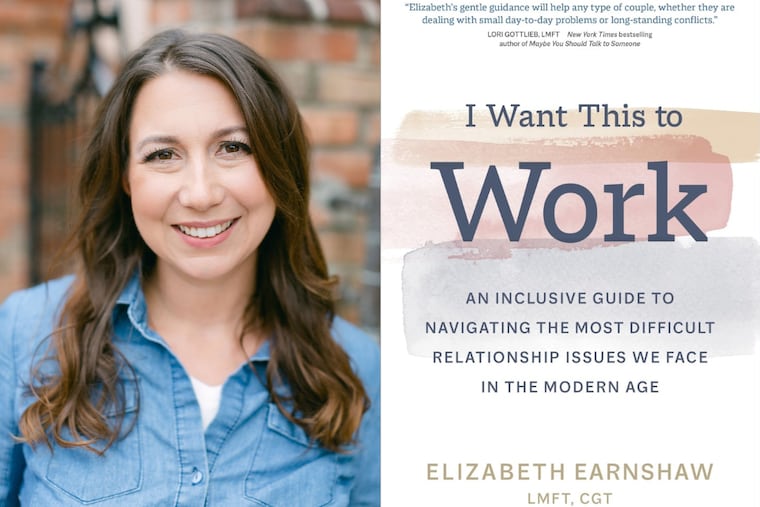A Philly therapist walks us through the emotional land mines of Mother’s Day
"For people who dread this day, I first want to say that there is no shame in that," Elizabeth Earnshaw, author of the 2021 book "I Want This to Work," said.

The Mother’s Day origin story goes like this: Social activist Anna Reeves Jarvis, born May 1, 1864, conceived the idea following her mother’s death and convinced Philadelphia department store founder John Wanamaker to fund the celebration — “honoring the sacrifices mothers make for their children.”
Subsequently, in May 1908, 400 people attended a Methodist church service in Grafton, W.Va., where Jarvis’ mother was buried, while 15,000 attended the inaugural Mother’s Day festivities at Wanamaker’s auditorium in Philadelphia.
By 1909, the idea had spread nationwide as, according to Jarvis, “thousands and thousands ... found Mother’s Day a blessing, a comfort, and an uplift.” In 1914 Congress officially sanctioned Mother’s Day. But by 1920, Jarvis had disowned her creation. Frustrated with rampant commercialism, Jarvis campaigned against the holiday’s attendant purchases of candy, flowers, and cards.
Jarvis died childless in 1948 in the Marshall Square Sanatarium, in West Chester. Bankrupted by her campaign to end Mother’s Day, her funeral expenses were paid by the greeting card and flower industry.
For many others, Mother’s Day continues to be fraught.
Seeking guidance on how to navigate maternity celebration-day issues, we reached out to Elizabeth Earnshaw, author of the 2021 book, I Want This to Work: An Inclusive Guide to Navigating the Most Difficult Relationship Issues We Face in the Modern Age.
Earnshaw went to Temple University and Thomas Jefferson University, and launched A Better Life Therapy in 2013. In the decade since, her practice has opened offices in Philadelphia and Ardmore, providing individual, couples, and family counseling to thousands in the tristate area.
What advice do you have for people, with or without children, who dread this day?
For people who dread this day, I first want to say that there is no shame in that. The way we feel about our feelings impacts how we process them. So, if you feel there is something wrong with you for dreading it then you’re going to feel much worse. If, instead, you can offer yourself compassion for the fact that you feel so badly about the day then while you might still feel it you would be experiencing the shame alongside it.
What about people who are grieving their deceased mother? Or for a mother grieving a lost child?
Plan ahead. One of the biggest pieces of advice I have for grieving people is to plan ahead for the days and events that you already know might be upsetting. Everyone is different in what they plan — some people choose to plan to spend time alone and others choose to be busy. Some people choose to do something that memorializes their mother or the child — like eating at their favorite restaurant — and others prefer to have a low-key day that isn’t necessarily centered on the idea of Mother’s Day.
You don’t have to do anything other people expect you to do. If you want to skip the day or ignore the day, stick to what feels best for you.
And what could this day mean for women who have had an abortion?
This is deeply personal and depends on the person, the reasons for abortion, and how they’ve processed that experience. If you’ve had this experience and you’re noticing yourself having difficult feelings that is completely valid. It is also OK if you are not having difficult feelings.
And for those who are deliberately “no contact” with their mothers?
Regardless of your reasons for no contact, you might still have complicated feelings about your mother on Mother’s Day.
Here are a few things you might struggle with:
Meta emotions. This is the feeling you have about your feelings. For example, you might notice yourself feeling OK about being no contact, and you might notice that you feel guilty for being OK about it. If you’re experiencing meta emotions, try to name that for yourself. You might say something like “I feel OK about my decision today but I also recognize that there are parts of me that feel a little guilty. Both can be true.”
Regret. While you might have made the best decision for yourself at the time, maybe you feel regret about how you managed the situation.
Worry. While the decision might be right for you, you might find yourself worried about your parent. Allow both things to exist at the same time.
Grief. Most people want a relationship with their mothers. If you decided to cut ties, it was likely a very difficult and personal choice. On Mother’s Day you might grieve the parts of your mother you love or perhaps you grieve the fact that you never got the mother you desired.
Doubt. You might question your decision. Sometimes our decisions are not permanent and maybe you can lean into that by exploring if you want to continue to be cut off and if you would like to reengage with some boundaries in place.
And mothers who feel underappreciated by their children on this day?
As a mother myself, I know most mothers do their very best to love their children in the way they know how. It can be incredibly painful to feel as if all of that blood, sweat, and tears are not appreciated. If you have a close relationship with your child, you might want to find a time to talk about those feelings but Mother’s Day is likely not the best time. Picking a time to talk about your feelings without criticizing your child can help.
If your child has chosen to distance themselves, respecting their boundaries is a way toward building a relationship in the future. Finding someone you trust to talk about this with can help you process this pain without expecting your child to process it for you.